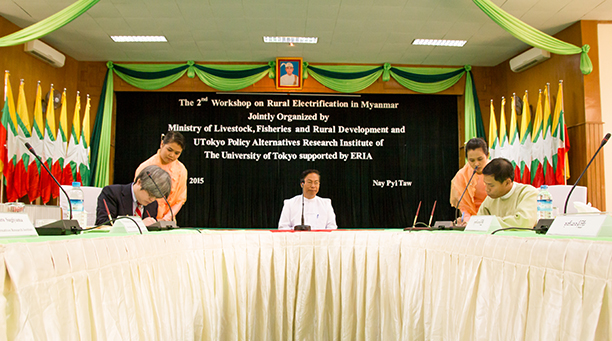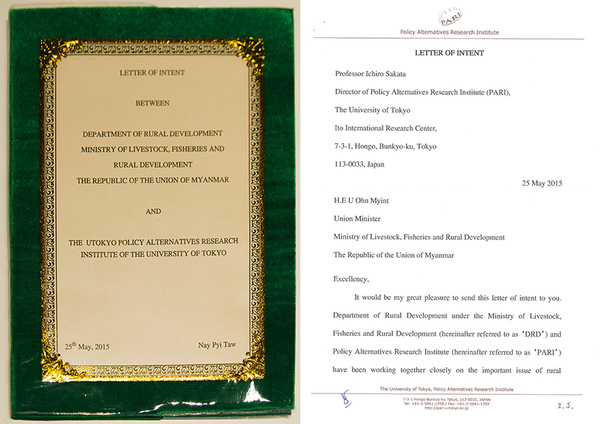The 2nd PARI-MLFRD Joint Workshop
"The Future Direction of Rural Electrification in Myanmar"
Report
May 25, 2015

Signing the Letter of Intent (LoI) that states mutual cooperation of Policy Alternatives Research Institute (PARI) and Ministry of Livestock, Fisheries and Rural Development (MLFRD) (left: Professor Sakata, Director of PARI, middle: Union Minister of MLFRD, Mr. Ohn Myint, overseeing the signing, right: Mr. Khant Zaw, Director General of Rural Development of MLFRD, provided the proxy signature for Union Minister Ohn Myint).
| [Date] | Monday, May 25, 2015, 14:30-17:30 |
|---|---|
| [Venue] | Meeting Room, 14 Department of Rural Development, The Ministry of Livestock, Fisheries and Rural Development, NayPyiTaw, Myanmar |
| [Co-hosted by] | Policy Alternatives Research Institute (PARI), the University of Tokyo The Ministry of Livestock, Fisheries and Rural Development (MLFRD), Government of Myanmar |
| [Supported by] | Economic Research Institute for ASEAN and East Asia (ERIA) |
The Ministry of Livestock, Fishery and Rural Development (MLFRD), Government of Myanmar, and UTokyo Policy Alternatives Research Institute (PARI) have conducted joint PARI-MLFRD workshops since last year1, sponsored by ERIA, with an aim to discuss the challenges and policies relevant to the rural electrification initiative in Myanmar, through which creating a mutual foundation of evidence-based policies among the ministries and agencies involved. On May 25, 2015, the 2nd PARI-MLFRD joint workshop was held in the Meeting Room at the MLFRD in NayPyiTaw, the capital of Myanmar. Approximately 50 participants including MLFRD Minister, Deputy Minister and Director General, and representatives of NGOs attended the event. Active discussions took place during the workshop.
At the start of the proceedings, Minister Ohn Myint (MLFRD) emphasized the importance of sustainability based on using biomass energy to promote electrification in rural areas and that of small-scale grids. In response, Prof. Sakata, the director of PARI, stated that in Japan a society with sustainable energy were considered one of the five pillars for the reconstruction efforts of the 'New Tohoku' in the wake of the Great East Japan Earthquake. Moreover, there was growing knowledge in Japan on distributed energy. Subsequently, Minister Ohn Myint2 and Prof. Sakata signed and exchanged a Letter of Intent (LoI). The aspects of the agreed cooperation include that PARI would provide advice based on their expertise, the government of Myanmar would provide primary dataset, while there would be mutual cooperation in respect of rural electrification and human resources development. Additionally, joint workshops would be arranged. The LoI would be in effect for the next three years, with the option of extending the agreement.
In view of the experience of the Asian Development Bank (ADB), the World Bank, and the Japan International Cooperation Agency (JICA) with related projects currently in progress, lively discussions took place on energy policy in Myanmar. Following are the three main points of discussion during the event.
The first discussion followed a question from Mr. Khin Maung Aye, Deputy Minister of MLFRD, and Mr. Khant Zaw, Director General of MLFRD, on creating agreement and cooperation between the energy generation sector, the energy distribution sector, and the energy transmission sector of Myanmar, as these sectors all had separate plans in progress. Dr. Sugiyama, Asistant Professor of PARI, pointed out that creating a harmonious and comprehensive power plan was a crucial issue. Additionally, he emphasized the value of sustained effort to revise the power plan every few years, while taking collaboration and agreement into account. To illustrate the importance of revision, he pointed out that the basic energy plan of Japan, established in 2003 based on the official energy policy, was revised in 2007 and in 2010; i.e., the revisions took place at least every three years.
The second main discussion followed a question by Mr. Khin Maung Aye, Deputy Minister, and Mr. Khant Zaw, Director General, MLFRD, on the electricity-cost subsidy policy and the implications for participation by the private sector. Prof. Hisashi Yoshikawa, Project Professor of PARI, stated that theoretically it was desirable to eliminate subsidies, as it could lead to more private investment. However, it was emphasized that realistically it was important to develop a schedule for the long-term raise of electricity costs. Further discussion was expected on this cost revision schedule, after the general election in November.
The third main discussion followed a question on a realistic plan for the reorganization of the ministries and agencies of the government of Myanmar. Mr. Nobuo Hashimoto, Project Researcher of PARI, mentioned the inadequacies of the current cooperation between the relevant ministries and agencies, and the importance of creating mutual understanding between and a united effort from these institutions. Moreover, a simpler administrative organization for energy could be needed in the future.
In addition to the above, questions were posed by representatives of MLFRD and other organizations, indicating that high expectations were entertained by not only MLFRD, but also other organizations concerned for the envisaged workshops. For example, the Myanmar Engineering Society (MES) pointed out that it was important for universities to present such lectures for young and middle ranking government officials on comprehensive energy policies. In view of such expectations, we hope to contribute to creating a comprehensive energy policy for Myanmar by the cooperation with MLFRD and in accordance with the provisions of the LoI, signed during this workshop. Based on what had been learned during the previous workshops, our object for the third workshop3 is to discuss the current situation, the challenges, and the future development of the rural electrification initiative in Myanmar, based on the actual situation.
Notes
- Please see /event/smp141128_rep2.html regarding the first workshop.
- Khant Zaw, The rural development director of MLFRD, signed the document.
- Please see /event/smp150206_rep.html for the energy policy workshop conducted as a counterpart to the Ministry of Energy.
Related Links
- Global Energy Policy and East Asia Research Unit
- PARI-MLFRD Joint Workshop "The Future Direction of Rural Electrification in Myanmar" Flash Report
- PARI-MLFRD Joint Workshop "The Future Direction of Rural Electrification in Myanmar" Detailed Report
- Ministry of Livestock, Fisheries and Rural Development, Myanmar (MLFRD)



